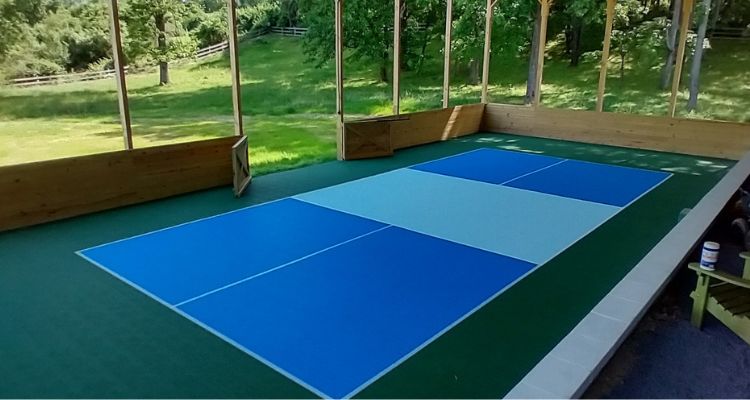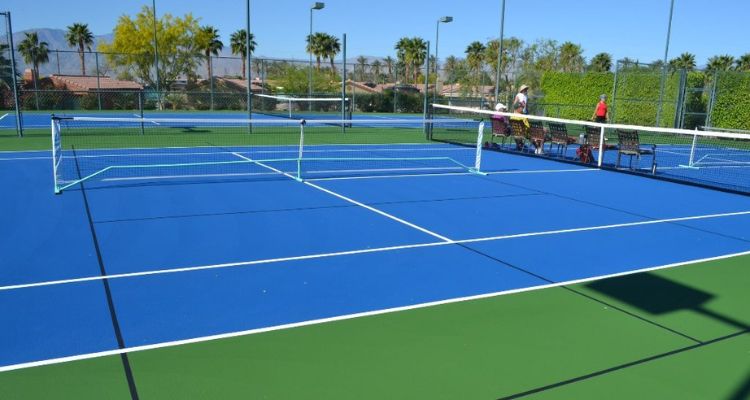Looking for new places to play pickleball? Ever wondered if you can play on a tile floor? Well, we’ve got all the answers you need! In this blog post, we’ll dive into the pros and cons of playing pickleball on a tile floor and give you some essential do’s and don’ts to keep in mind. So before you hit the court, let’s find out everything you need to know about playing pickleball on tile!
Can You Play Pickleball on a Tile Floor?
Yes, you can! Playing pickleball on a tile floor can actually provide a great playing surface. The low friction and durability of tile make it a favorable choice for many players. However, there are a few things to consider before you grab your paddle.

Safety and comfort should always be a top priority, so make sure to wear shoes with good grip to prevent any slipping during the game. You should also use pickleballs specifically designed for hard court surfaces to ensure optimal play.
Keep in mind that the tile floor may cause the ball to bounce higher and faster than on other surfaces. So be ready to show off your quick reflexes when playing on tile!
Pros and Cons of Playing on a Tile Floor
Now let’s take a look at the advantages and disadvantages of playing pickleball on a tile floor.
Pros
- Durability and Stability: Tile flooring can withstand the weight of countless footsteps and the impact of the ball and paddle without showing any signs of damage. Plus, the firm base reduces the risk of tripping or falling during gameplay.
- Low Maintenance: Unlike other flooring materials, tile requires minimal maintenance. Just a simple cleaning and disinfecting with a mild detergent solution and a mop will do the trick.
- Improved Traction: The texture of tile floors provides better traction, allowing players to move around easily without slipping or sliding. This not only enhances the overall playing experience but also reduces the risk of injuries.
Cons
- Slippery When Wet: One drawback of tile flooring is that it can become slippery when wet. It’s important to keep the surface dry to avoid any accidents, especially for older adults or players with mobility issues.
- Risk of Injury: Slipping on a tile floor can lead to mild bruises or sprains, but it can also result in more severe injuries like fractures or head injuries. So take extra caution when playing on tile, especially if the surface is wet.
- Increased Noise Level: Playing on a tile floor can create a loud noise during gameplay. The sound of the ball bouncing off the paddle and the surface can echo throughout the room, which may disrupt the game for both players and spectators.
Do’s & Don’ts of Playing on a Tile Floor
To ensure a safe and enjoyable experience for everyone, here are some important tips to keep in mind when playing pickleball on a tile floor:

Do’s
- Wear Appropriate Footwear: Opt for proper athletic shoes with good traction to prevent slipping.
- Keep the Surface Dry: Make sure to thoroughly dry the tile floor before playing, especially after cleaning.
- Use a Non-slip Grip on Your Paddle: Improve your grip and prevent the paddle from slipping out of your hand by using a non-slip grip.
- Communicate With Your Partner: Establish a system of signals or calls to avoid collisions and injuries on the court.
- Respect the Noise Level: Be mindful of others nearby and avoid excessive noise or shouting.
Don’ts
- Don’t Wear Street Shoes: Street shoes can damage the tile flooring and increase the risk of slipping. Stick to proper athletic shoes.
- Don’t Allow Liquids on the Court: Liquids can make the tile floor slippery, so clean up spills immediately and avoid bringing beverages onto the court.
- Don’t Lean on the Net: Avoid leaning on the net as it can cause damage and instability.
- Don’t Bring Food or Chewing Gum onto the Court: Food and gum can create a mess and make the tile flooring slippery. Keep the court clean.
- Remember to Warm Up and Stretch: Warm up and stretch before playing to prevent injuries and improve gameplay.
FAQs
Can pickleball be played on a wooden floor ?
Yes, it can! However, it’s best to use an indoor court surface or specifically designed pickleball court tiles for the best playing experience. Wooden floors can be slippery and require specific care and maintenance.
What kind of floor is used for pickleball?
A hard, flat surface such as wood, concrete, tile, or sport court flooring is ideal for playing pickleball. Outdoor courts are often made of asphalt or concrete with permanent court boundary lines.
What does indoor pickleball look like?
Indoor pickleball is typically played on a badminton-sized court with walls on the sides. The court is divided in two by a high net, and players use paddles and a plastic ball to score points.
In Conclusion
Playing pickleball on a tile floor is definitely possible, but it does come with its challenges. The smooth surface of the tiles can make certain shots more difficult, and there’s a risk of slipping or falling. However, by following the do’s and don’ts and taking precautions, you can have a safe and enjoyable experience playing pickleball on tile. We hope this article has provided you with all the information you need to confidently decide where to play next time!




